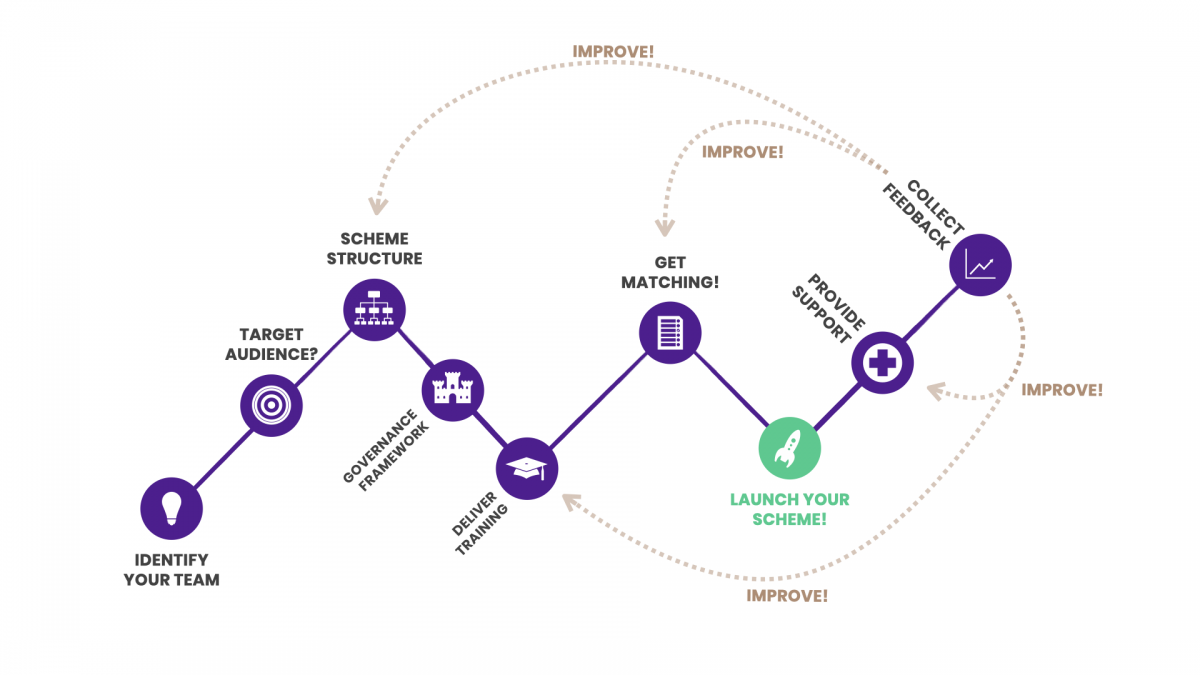Getting started
We have a number of established mentoring schemes for trainees available through EOE Mentoring and are in the process of expanding this across more specialties.
You may wish to set up your own mentoring scheme. If you think we might be able to help or facilitate, please email: england.mentoring.eoe@nhs.net
We have created a package of template documents that you can use and adapt in your own scheme including application forms, mentor person specification, feedback forms, reflection proformas, and mentoring agreements. These can all be downloaded from the links at the bottom of this page. There are lots of schemes being developed all over the region and by sharing our experiences and resources we can make it easier for others to start their own schemes - so let us know how you're getting on!
What Are The Benefits of Mentoring for Organisations?
With increasing concerns about low morale, attrition, and burnout amongst junior doctors, NHS Improvement has identified mentoring as one of "Eight high impact actions to improve the working environment for junior doctors". These actions have been endorsed by many other professional bodies.
Other benefits include:
• Enabling talented individuals within the organisation to reach their full potential
• Supporting staff stepping into new roles and during times of transition
• Improved staff wellbeing and motivation
• Enhancing staff retention
• Better productivity
Top Tips for Setting Up A Mentoring Scheme
1. MANY HANDS
Have a core team to work together & divide tasks. In addition, the support of a senior colleague can provide further credibility and oversight to the scheme - helping you to establish yourself.
2. TARGET AUDIENCE
Who will your scheme be open to? You could target according to grade, specialty or even location. Once decided, who will your mentors be? (e.g. peer or non-peer mentoring).
3. SCHEME STRUCTURE
You will need to determine how you want your scheme to run. Do you want to specify the frequency of meetings or duration of relationship - or let the individual pairs decide?
4. GOVERNANCE
Consider issues like contracting and confidentiality. YOU NEED to have a clear process for dealing with any concerns that arise and ensuring that both Mentors and Mentees feel supported. Please see template documents below.
- Scheme standards
- Mentee & Mentor application forms
- Matching emails
- Person specification (mentors)
- Mentor-Mentee agreement
- Feedback forms
5. EDUCATION
Training is essential to the success of your scheme. Research suggests that only 30% of mentoring relationships are successful when no training is supplied. This increases up to 90% when training is provided to BOTH MENTEE AND MENTOR. Will you deliver this training yourself or will you direct your members to external training resources?
6. GAME, SET & MATCH
Decide upon your matching process. It is good practice to seek preferences from Mentees before matching them, but it will not always be possible to match everyone with their first choice.
- Mentee input in pairings is often preferable
- Mentors should NOT be supervisors / involved in their appraisal
- NO FAULT DIVORCE
7. LIFT OFF
Consider whether a launch event (even a virtual one!) would raise the profile of your scheme and encourage your Mentors and Mentees to get to know each other.
8. SUPPORT ONE ANOTHER
Consider meetings or workshops for your Mentors to allow them to share good practice and support each other.
- Participants must be adequately supported
- Supervision for mentors
- Referral pathways for doctors in need should be clear
- Programme coordinators should be easily contactable
9. FEEDBACK
Regular reviews and feedback are key to improving your scheme and driving it forwards.
- General Medical Councils statement on mentoring can be found here.
- Royal College of Psychiatrists have produced a document outlining the difference between mentoring and coaching which can be found here.
- The Royal College of Surgeons of England have produced a guide to good practice in mentoring
Visit out Mentoring resources page or email us if we can support you further
- Association of Anaesthetists of Great Britain and Ireland - run mentoring courses aimed at anaesthetists.
- Royal College of Obstetricians and Gynaecologists - StratOG has a mentoring e-learning module in ‘Core Training’ ‘The Obstetrician & Gynaecologist as a Teacher, Researcher & Professional’ It is free to members and costs £48 for non-members
- Royal College of Physicians - run a Mentoring Skills Workshop that is aimed at Doctors of all specialties and grades who are interested in taking on a mentoring role in their workplace, or who already have mentoring responsibilities and would like to improve their practice.
- The Faculty of Medical Leadership and Management offer an online "Mentoring skills for doctors" course
Gain a qualification in coaching and mentoring
The Institute of Leadership and Management qualifications are internationally recognised and range from an introduction to mentoring to a postgraduate qualifications in executive coaching and mentoring.
Find out more here
Join the Royal College of Paediatrics and Child Health Mentoring Champions Network
"The Mentoring Champions Network is a new initiative which aims to promote mentoring and support paediatricians who are keen to promote mentoring within their organisation."
Find out more here

